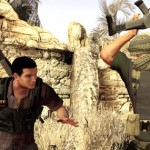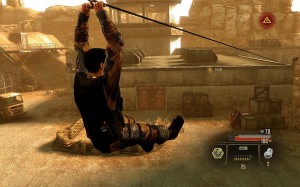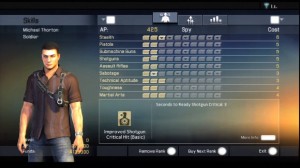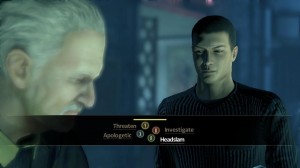 If everyone hates Alpha Protocol, why do I love it so much? Thats the question that kept coming into my head as I played. Rarely does a game that’s so critically and commericaly unsuccesful exhibit such clever design and solid gameplay along with an ambitious open ended storyline. If much of Alpha Protocol is so good, why does everyone think its so bad?
If everyone hates Alpha Protocol, why do I love it so much? Thats the question that kept coming into my head as I played. Rarely does a game that’s so critically and commericaly unsuccesful exhibit such clever design and solid gameplay along with an ambitious open ended storyline. If much of Alpha Protocol is so good, why does everyone think its so bad?
Well first of all there’s a few excpetions to mention. Not everyone thought Alpha Protocol was bad. A few publications gave it middling rather than poor review scores and fewer still conceded that it was a good-but-flawed title. The scores themselves were seldom low, but the overwhelming tone was luke-warm. Was the game so average, so pedestrian, that it deserves such scant attention?
For all its flaws, its a game that can’t be easily summarized. Reference points are numerous but varied. The combat, movement and camera are all Mass Effect, but the stealth and gadgets are MGS. The open ended storyline and cavalier attitude towards the death of main NPC’s is like Heavy Rain, but the skill trees and wide range of different approaches to conflict is like Deus Ex. The hairier moments of combat play as badly as Kane and Lynch though and the glitches often make you think you might have stumbled into Fallout country.
 For all these touch points though, Alpha Protocol puts its own twist on things. The storyline revolves around the exploits of Agent Thornton, a customisable avatar who you stick with throughout the campaign as it flits forwards and backwards in time. Like Black Ops, the game begins with your interrogation and moves back to the previous events that led to your incarceration. The storyline itself twists and turns, taking for inspiration the best moments from the Bourne movies, James Bond and even 24. In fact it seems like these three franchises were very much in mind when the game was developed as the three approaches available in any given in-game conflict mirror the approaches of the respective heroes: Bauer’s anger, Bourne’s professionalism or Bond’s suave composure.
For all these touch points though, Alpha Protocol puts its own twist on things. The storyline revolves around the exploits of Agent Thornton, a customisable avatar who you stick with throughout the campaign as it flits forwards and backwards in time. Like Black Ops, the game begins with your interrogation and moves back to the previous events that led to your incarceration. The storyline itself twists and turns, taking for inspiration the best moments from the Bourne movies, James Bond and even 24. In fact it seems like these three franchises were very much in mind when the game was developed as the three approaches available in any given in-game conflict mirror the approaches of the respective heroes: Bauer’s anger, Bourne’s professionalism or Bond’s suave composure.
Its strange that more games haven’t effectively leveraged the affection and familiarity audiences feel for spy stories and movies. Other than James Bond games of varying degrees of quality, games of international espionage are few and far between. Alpha Protocol hits all the culturally significant spy locales: opulent hotels in Rome, subways in Taipei and underground lairs in top secret locations. From cracking safes to stealing the plans for top secret weapons to seducing the plucky, sassy news reporter, there’s no aspect of Bond that’s not mined for material. It’s not Goldeneye, but then Goldeneye was always a shooter first and a spy game second. In many ways it has more in common with the overlooked N64 game Mission Impossible (now there’s a game that doesn’t get many mentions these days).
 The gameplay in Alpha Protocol probably suffers most from its open ended nature. If you set up a level that can be tackled with gadgets, guns blazing or stealth then it seems unlikely that all three approaches will be equally enjoyable or well balanced. In my playthrough I deposited every upgrade point I earned into just two skills: stealth and pistols. At heart an RPG, this set up provided me with bonuses such as invisibility, markers showing enemy positions and a combat system that was essentially VATS from Fallout 3. Had I chosen different options when levelling the play experience could have been so fundamentally different that it would felt like a different game. In fact, I suspect that had I chosen some of the other upgrade paths the game would have suffered significantly and this could be a factor in the low reviews the game received. It seems to be the way with Japanese games that they are willing to let a player completely ruin their game through ill advised upgrade choices. Just ask anyone still struggling with Demon Souls.
The gameplay in Alpha Protocol probably suffers most from its open ended nature. If you set up a level that can be tackled with gadgets, guns blazing or stealth then it seems unlikely that all three approaches will be equally enjoyable or well balanced. In my playthrough I deposited every upgrade point I earned into just two skills: stealth and pistols. At heart an RPG, this set up provided me with bonuses such as invisibility, markers showing enemy positions and a combat system that was essentially VATS from Fallout 3. Had I chosen different options when levelling the play experience could have been so fundamentally different that it would felt like a different game. In fact, I suspect that had I chosen some of the other upgrade paths the game would have suffered significantly and this could be a factor in the low reviews the game received. It seems to be the way with Japanese games that they are willing to let a player completely ruin their game through ill advised upgrade choices. Just ask anyone still struggling with Demon Souls.
Outside of the stealth based combat, character interactions make up the rest of the game. The conversation and mission briefings do a good job of setting the scene for the action to come. Operating in a similar way to Heavy Rain your conversation responses are time limited, flashing up on screen for just a few seconds and forcing you to pay close attention to what’s happening. The dialogue is frequently bad, but the characters are strangely likeable with main avatar Thornton channelling Nathan Drake, but in a less slightly irritating way (at least to my ears). The supporting cast meanwhile runs the gamut from dull to batshit crazy with the most extreme characters like torturer and playboy Steven Heck being the best.
 The rhythm of the game is mission, conversation, checking emails for mission info, buying upgrades and equipment, mission. For the most part this works well breaking up the gameplay into enjoyable bite sized chunks without any one section outstaying its welcome. Between missions, relaxing in your safe house (whether it’s the trendy Moscow pad or the Taipei underground lair) helps pace the action and the mementos of your past successes scattered around are a nice touch. These sections aren’t exactly the Nomandy, but they serve their purpose.
The rhythm of the game is mission, conversation, checking emails for mission info, buying upgrades and equipment, mission. For the most part this works well breaking up the gameplay into enjoyable bite sized chunks without any one section outstaying its welcome. Between missions, relaxing in your safe house (whether it’s the trendy Moscow pad or the Taipei underground lair) helps pace the action and the mementos of your past successes scattered around are a nice touch. These sections aren’t exactly the Nomandy, but they serve their purpose.
Although up to this point Alpha Protocol sounds like a collection of all the best bits of ten different games, there are some serious rough edges that you’ll have to overlook. Crippled enemy AI, bizarre NPC behaviour and pathing issues abound. The game is fug ugly too and the overblown score seems to reach dramatic crescendos at all the wrong times. Minigames to disable alarms or pick locks are frustrating, plot twists are nonsensical and cinematic set pieces fall flat.
Despite all this, the freedom offered to the player in the choices they can make, the friendships they form and fundamentally the game they choose to play is emancipating. In a market where major releases can play out like rollercoaster rides with pop-up targets, Alpha Protocol stands out as a title that tries to make your choices as a player count. Maybe in time it will be more fondly remembered and even inspire other games to give the player more choice in how they play. For the moment though, it remains that game that everyone seems to hate, but I can’t help but love.
